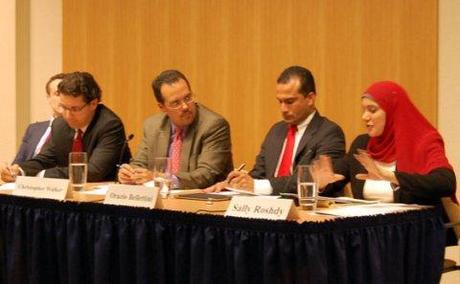
Sally Roshdy was a CIPE-Atlas Corps Think Tank LINKS Fellow at the Project on Middle East Democracy (POMED).
It was a great pleasure participating in the Think Tank LINKS Fellowship in Washington DC and serving at the Project on Middle East Democracy (POMED). Once I learned that the accepted applicants would serve at an American think tank, I was very interested in applying to this prestigious fellowship. The first time I heard the term “think tank” was in my second year at the Faculty of Economics and Political Science at Cairo University when one of my professors emphasized the significance of think tanks and their role in helping decision-makers in all fields of public policy.
I pondered why think tanks play a major role in developed countries but not in developing countries, and I became interested in learning about various think tank models because, at the time, I hadn’t heard of any well-known research organizations in Egypt. After that, and as a result of the stories I heard from my professor about the crucial role played by think tanks in Europe and America, I became very passionate about the necessity of having effective think tanks in Egypt, along with the acknowledgement by decision-makers of the role they can play. I even decided to write my master’s thesis on this topic, to analyze if we have effective think tanks in Egypt and the challenges they face in influencing the decision-making process.
During my Think Tank LINKS Fellowship, I became closer to the world of think tanks – learning how they operate and what makes one think tank more influential than another. This fellowship helped build my foundational understanding of think tanks, both theoretically and practically. For my theoretical foundation, I visited the Democracy Resource Center at the National Endowment for Democracy, where I accessed many books and articles about the world of think tanks, including the relationship between think tanks and civil society, think tank traditions, think tanks and policy advice, and how policy institutes or think tanks can measure their impact on the decision-making process. This literature helped enhance my thesis research as well.
Practically, my service at the POMED opened my eyes to the internal operation of a small yet active think tank dedicated to examining how genuine democracies can develop in the Middle East and how the U.S. can best support the process. Through my engagement with POMED’s four programs – Civil Society Partnerships, Dialogue, Research, and Advocacy – I’ve learned many skills related to think tank management, including agenda setting, policy analysis, and advocacy for policy alternatives.
I also gained valuable skills in the field of partnership-building, since POMED cooperates with NGOs in the Middle East to build their capacity and increase the impact of regional think tanks and advocacy organizations (they believe that in a healthy democracy, advocacy organizations and think tanks serve as critical links between the government and engaged citizens). Building on its own experiences, POMED guides and mentors its partners in producing policy analysis and developing policy recommendations for their national policymakers, mirroring the role played by POMED in Washington. Through this program, I also communicated with more than 9 organizations from the region as I helped POMED to organize its first-ever regional conference for its partners in Middle East.
The Think Tank LINKS Fellowship also gave me the opportunity to publish my writing in different platforms, including the CIPE Development Blog, Atlas Corps’ blog, and Muftah.org. I was also offered the opportunity to participate in several events to speak about my views on the challenges facing think tanks in developing countries (especially Egypt) and what they should do to become effective policy institutions serving the needs of their nations’ transitions to democracy.
Overall, I feel lucky to have been able to work in such an interesting environment that I feel so passionately about and I am glad I participated in the inaugural class of CIPE-Atlas Corps Think Tank LINKS Fellowship program.
CIPE-Atlas Corps Think Tank LINKS Fellowship brings talented young professionals with strong research backgrounds to shadow researchers and experts at leading U.S. think tanks for six month. Sally Roshdy was part of the inaugural class, and served at the Project on Middle East Democracy (POMED).

